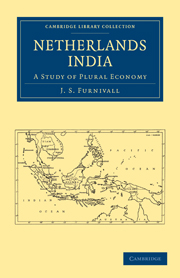Book contents
- Frontmatter
- INTRODUCTION
- Contents
- TERRITORIAL DIVISIONS
- NETHERLANDS INDIA
- AUTHOR'S PREFACE
- LIST OF GENERAL REFERENCES
- GLOSSARY
- MEASURES AND CURRENCY
- THE MALAY ARCHIPELAGO, IN COMPARISON WITH EUROPE
- Chapter I INDONESIA, TO 1600
- Chapter II THE EAST INDIA COMPANY, 1600–1800
- Chapter III THE YEARS OF CONFUSION, 1795–1815
- Chapter IV THE YEARS OF UNCERTAINTY, 1815–1830
- Chapter V THE CULTURE SYSTEM, 1830–1850
- Chapter VI THE TRANSITION TO LIBERALISM, 1850–1870
- Chapter VII LIBERALISM, 1870–190
- Chapter VIII EFFICIENCY, WELFARE AND AUTONOMY
- Chapter IX ADMINISTRATIVE AND POLITICAL REFORMS
- Chapter X ECONOMIC PROGRESS
- Chapter XI SOCIAL ECONOMY
- Chapter XII SOME EFFECTS OF THE CRISIS OF 1929
- Chapter XIII PLURAL ECONOMY
- INDEX OF REFERENCES
- GENERAL INDEX
Chapter VI - THE TRANSITION TO LIBERALISM, 1850–1870
Published online by Cambridge University Press: 07 September 2010
- Frontmatter
- INTRODUCTION
- Contents
- TERRITORIAL DIVISIONS
- NETHERLANDS INDIA
- AUTHOR'S PREFACE
- LIST OF GENERAL REFERENCES
- GLOSSARY
- MEASURES AND CURRENCY
- THE MALAY ARCHIPELAGO, IN COMPARISON WITH EUROPE
- Chapter I INDONESIA, TO 1600
- Chapter II THE EAST INDIA COMPANY, 1600–1800
- Chapter III THE YEARS OF CONFUSION, 1795–1815
- Chapter IV THE YEARS OF UNCERTAINTY, 1815–1830
- Chapter V THE CULTURE SYSTEM, 1830–1850
- Chapter VI THE TRANSITION TO LIBERALISM, 1850–1870
- Chapter VII LIBERALISM, 1870–190
- Chapter VIII EFFICIENCY, WELFARE AND AUTONOMY
- Chapter IX ADMINISTRATIVE AND POLITICAL REFORMS
- Chapter X ECONOMIC PROGRESS
- Chapter XI SOCIAL ECONOMY
- Chapter XII SOME EFFECTS OF THE CRISIS OF 1929
- Chapter XIII PLURAL ECONOMY
- INDEX OF REFERENCES
- GENERAL INDEX
Summary
1. Fall of Van den Bosch. By 1850, the succession of famines in India, the stagnation of production and consumption, and the slower rate of increase of the European population were all signs that the impulse to production given by the Culture System was fading; but new developments in the Netherlands, in shipping, commerce and manufacture, showed that private enterprise was ready to take its place. The Culture System was passing, not because it failed, but because it succeeded, and not because of distress in India, but because of a new balance of power at home; it had achieved all that Van den Bosch had promised, in Europe as well as in the East. In India few could, or dared, criticize it, but in the Netherlands it had called into existence a politically-conscious Liberal middle class, increasingly dissatisfied with the financial administration, first in Europe and then in the Colony; this class aimed originally at obtaining the power of the purse at home and, later, at obtaining control over colonial profits. During the period of transition there were three stages: (i) Liberal Opposition to the Crown (1840–48); (ii) Liberal Opposition to the Colonial Government—the“Colonial Opposition” (1848–62); and (iii) the triumph of Liberalism (1862–70).
In 1815 the Dutch had willingly given William a blank cheque, and, up to 1830, even his lavish expenditure did not shake their confidence; but when, after eight years of war and an addition of f. 300 million to the burden of debt, he was compelled in April 1839 to arrange terms with Belgium rather less favourable than he could have had in 1830, his people were more critical.
- Type
- Chapter
- Information
- Netherlands IndiaA Study of Plural Economy, pp. 148 - 173Publisher: Cambridge University PressPrint publication year: 2010First published in: 1939

